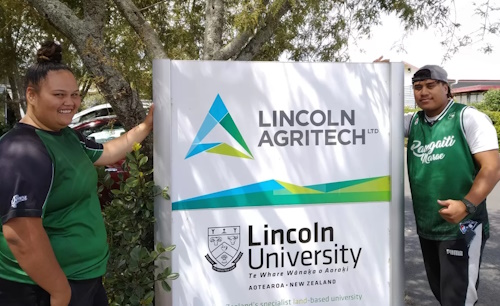
Pare Wilson (left) and Reuben Gillett have been working with Lincoln Agritech’s Hamilton-based scientists over summer.
Working with Lincoln Agritech freshwater scientist Dr Juliet Clague over summer has had a profound effect on two final-year students from a Waikato wharekura.
Pare Wilson and Reuben Gillett (both Ngāti Hauā) had both completed Year 13 at Te Wharekura o Te Rau Aroha, near Matamata. There, they were introduced to ecology by Manaaki Whenua – Landcare Research senior researcher Dr Norman Mason, who has been teaching native tree identification and plant biology, funded by an Unlocking Curious Minds grant.
Norman approached Juliet to ask if she and Lincoln Agritech would be interested in working with students over summer. “I thought they could learn something that I couldn’t teach them,” he says.
Juliet and Lincoln Agritech said yes, and developed a summer internship for Pare and Reuben, based on the Piakonui and Piakoiti streams, within the iwi’s rohe. For three weeks, Pare and Reuben learned how to gauge river flows, did stream health assessments, took samples for analysis (including nitrates), and analysed data. Now they’re preparing a report on what they found.
The experience has had a profound effect on Reuben, who says it’s made him think differently about the kind of work he wants to do.
“It’s changed the way I look at the rivers,” he says. “It’s probably encouraged everybody to look after the streams.
“I now feel I should be looking for this type of job. It’s given me second thoughts about what I really want to do.”
Pare says she’s always wanted to be a teacher, and this experience has strengthened that desire.
It’s also been educational for Juliet, who works on Lincoln Agritech’s Critical Pathways programme, defining how groundwater flows at a local level and how nitrates travel through the soil into the water.
“It’s been a really good experience,” she says. “It’s been really interesting in trying to explain things in a way that people without a PhD can understand, and making it relevant for them.”
Norman, who has made a long-term commitment to the school, says he’s always looking at his network to find different opportunities for exposing the students to science.
“It’s all about normalising science, instead of it being weird, strange, or even scary.” He’s already planning lessons on identifying common weeds, to help the children learn how to care for their land.
Juliet’s also keen to continue working with the school. “We may team up a little bit more with the students themselves during term time, doing a few lessons. It’s certainly something that we’re keen to pursue.”
And the school is equally as keen to continue the relationship. “Te Wharekura o Te Rau Aroha can see clear benefits for their students in working with scientists from Lincoln Agritech,” says head teacher Hinematua Gillett.
“The experience the students gain helps to nurture an ongoing interest in science, and empowers them to fulfil their responsibilities as kaitiaki of their freshwater ecosystems.”


